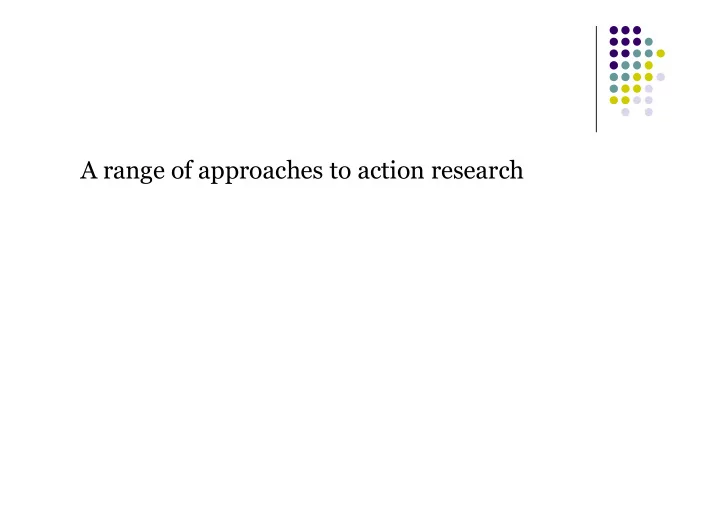

A range of approaches to action research
Kurt Lewin (1946) “it is in trying to change social situations that we best come to understand them”
Stephen Kemmis and Robin McTaggart (1988) developed Lewin’s model further. Explanatory text by Jean McNiff
Elliot argues that the general idea should be allowed to change, that reconnaissance should include analysis and fact finding and should occur throughout the action research process and not only at the beginning stage. John Elliott (1991)
Cycles. Black lines are the main direction of the research. Dotted lines indicate backward and forward movements as information is refined . Emily Calhoun 1994
Community Based Action Research Look: Gather relevant information. Build a picture. Describe the situation. Think: Explore and analyse. What is happening here? Interpret and explain how/why are things the way they are? Act: Plan: describe in detail the things you will do. Implement: Support and monitor those activities. Evaluate: What we have achieved. (Ernie Stringer. 1999)
Example Questions from Action Planner � What is my concern? � Why am I concerned? � How do I gather evidence to show reasons for my concern? � What do I do about the situation? � How can I check whether any conclusions I come to are reasonably faire and accurate? � How do I evaluate the validity of my account of learning? � How do I modify my practice in the light of my evaluation? � How do I explain the significance of my work? McNiff, J. 2006 McNiff, J. (2013). Action Research Principles and Practices Further developments in action research
Plan, Act, Reflect through 3 cycles. Eileen Piggot-Irvine, 2006
Living Educational Theory � How do I improve my practice? ‘I’ existing as a living contradiction e.g. holding certain values while denying them in practice. � Individuals can create their own theory as descriptions and explanations of their own learning as they live their life of enquiry. � Individuals have the capacity to clarify the meanings of their embodied (ontological) values in the course of the emergence of their values in practice. � Living educational theories can influence the education of social formations in ways that have significance for the future of humanity. � (Whitehead, J. 1989)
Cooperative Inquiry Cooperative inquiry creates a research cycle among four different types of knowledge: propositional knowing (as in contemporary science), practical knowing (the knowledge that comes with actually doing what you propose), experiential knowing (the feedback we get in real time about our interaction with the larger world) and presentational knowing (the artistic rehearsal process through which we craft new practices). John Heron (1996). Co-operative Inquiry
Action Research and Digital Technologies We encourage practitioners to become more educationally entrepreneurial (Crotty, 2012) by taking risks, awakening their creativity and bringing new ideas into action. Individuals develop their own sense of being as they learn in relation with others. The idea of pedagogy of the unique (Farren, 2005) expresses the belief that each person has a distinctive constellation of values that motivate their enquiry and that sets a distinctive context in which the enquiry proceeds. Further information: http://www4.dcu.ie/cwlel/research-approach.shtml
Validity and Rigour of Action Research Validity: Does the research do the things it claims to do, and can the reader believe the results? Rigour: Action Research cycles.
Recommend
More recommend